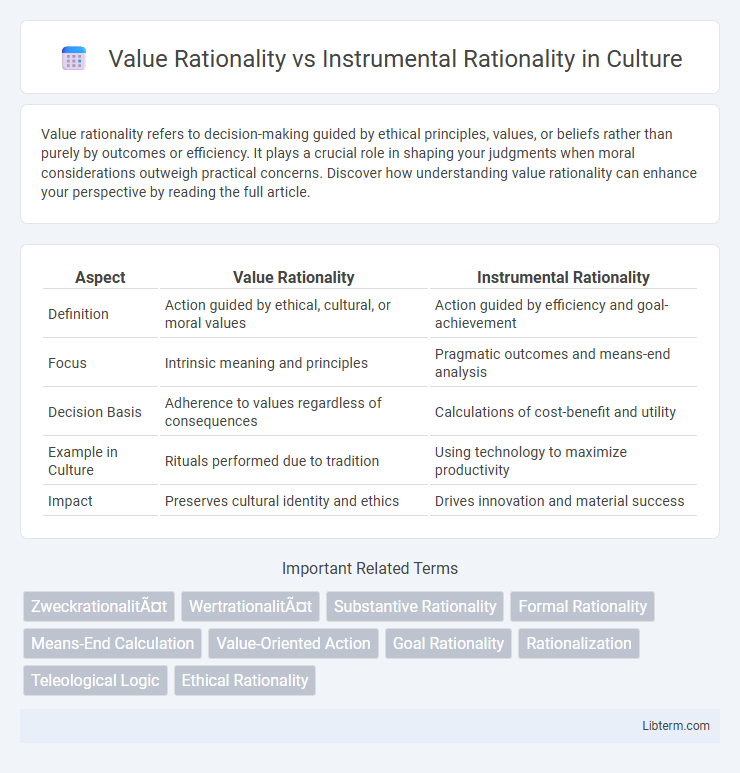Value rationality refers to decision-making guided by ethical principles, values, or beliefs rather than purely by outcomes or efficiency. It plays a crucial role in shaping your judgments when moral considerations outweigh practical concerns. Discover how understanding value rationality can enhance your perspective by reading the full article.
Table of Comparison
| Aspect | Value Rationality | Instrumental Rationality |
|---|---|---|
| Definition | Action guided by ethical, cultural, or moral values | Action guided by efficiency and goal-achievement |
| Focus | Intrinsic meaning and principles | Pragmatic outcomes and means-end analysis |
| Decision Basis | Adherence to values regardless of consequences | Calculations of cost-benefit and utility |
| Example in Culture | Rituals performed due to tradition | Using technology to maximize productivity |
| Impact | Preserves cultural identity and ethics | Drives innovation and material success |
Understanding Value Rationality
Value rationality refers to decision-making driven by adherence to ethical principles, cultural norms, or intrinsic values, regardless of outcomes. It emphasizes actions motivated by a commitment to beliefs or ideals, rather than efficiency or practicality. Understanding value rationality is crucial for analyzing behaviors rooted in moral convictions or social norms that transcend mere cost-benefit analysis.
What Is Instrumental Rationality?
Instrumental rationality refers to the process of choosing the most efficient means to achieve a specific goal or desired outcome. It emphasizes practical decision-making based on cost-benefit analysis, optimizing actions to maximize utility or success. This type of rationality is central in economics, game theory, and behavioral sciences, focusing on goal attainment through measurable and strategic actions.
Core Differences Between Value and Instrumental Rationality
Value rationality centers on actions guided by ethical beliefs, cultural values, or intrinsic principles, prioritizing meaning over outcomes. Instrumental rationality evaluates actions based on their efficiency in achieving specific goals or practical results, emphasizing optimization and effectiveness. The core difference lies in value rationality's commitment to inherent norms, whereas instrumental rationality focuses strictly on the utility and consequences of actions.
Philosophical Origins of Rationality Concepts
Value rationality, rooted in Max Weber's sociological theory, emphasizes actions guided by ethical, moral, or cultural values regardless of the outcome. Instrumental rationality, emerging from Enlightenment philosophy and utilitarianism, focuses on goal-oriented behavior aimed at maximizing efficiency or utility through calculated means. These contrasting concepts reflect foundational debates in philosophical origins surrounding reason, intention, and the justification of human action.
Examples of Value Rationality in Everyday Life
Value rationality is evident when individuals act based on deeply held beliefs or ethical principles, such as a person volunteering for charity work despite personal inconvenience. Choosing to follow religious practices strictly, regardless of social or economic consequences, exemplifies value rationality. Another example includes a whistleblower exposing unethical behavior motivated by integrity rather than personal gain.
Instrumental Rationality in Decision Making
Instrumental rationality in decision making prioritizes selecting the most efficient means to achieve a specific goal, emphasizing outcomes and cost-benefit analysis. This approach evaluates choices based on their effectiveness in maximizing utility or profit, often applied in economics, business strategy, and policy planning. By optimizing decisions through measurable criteria, instrumental rationality ensures goal-oriented actions are systematically aligned with desired results.
The Role of Values in Human Behavior
Value rationality emphasizes actions guided by deeply held ethical, cultural, or moral principles, driving individuals to act based on intrinsic beliefs rather than outcomes. Instrumental rationality prioritizes efficiency and goal attainment through calculated means, often resulting in behavior oriented toward maximizing rewards or minimizing costs. The role of values in human behavior under value rationality underscores decision-making rooted in meaning and commitment, contrasting with instrumental rationality's focus on pragmatic effectiveness.
Instrumental Reasoning in Modern Society
Instrumental rationality in modern society emphasizes efficiency and goal-oriented decision-making, prioritizing means to achieve specific ends. This form of reasoning dominates economic policies, technological innovation, and organizational management, where quantifiable outcomes and optimization strategies are paramount. Its influence shapes behaviors and institutions by incentivizing cost-benefit analyses and pragmatic problem-solving over intrinsic values or moral considerations.
Debates and Critiques: Value vs Instrumental Rationality
Debates surrounding value rationality versus instrumental rationality highlight tensions between actions driven by intrinsic ethical values and those motivated by efficiency or practical outcomes. Critics argue value rationality can lead to rigid idealism, while instrumental rationality may result in moral compromise or ethical relativism. Scholars emphasize the need for integrating both rationalities to address complex social and political challenges effectively.
Implications for Ethics and Policy
Value rationality emphasizes actions guided by ethical principles and intrinsic values, shaping policies that prioritize moral integrity over mere efficiency. Instrumental rationality focuses on achieving specific goals through cost-benefit analysis, often driving policies that optimize outcomes but may compromise ethical considerations. The tension between these rationalities influences ethical frameworks in policymaking, requiring a balance between adherence to core values and practical effectiveness in implementation.
Value Rationality Infographic

 libterm.com
libterm.com